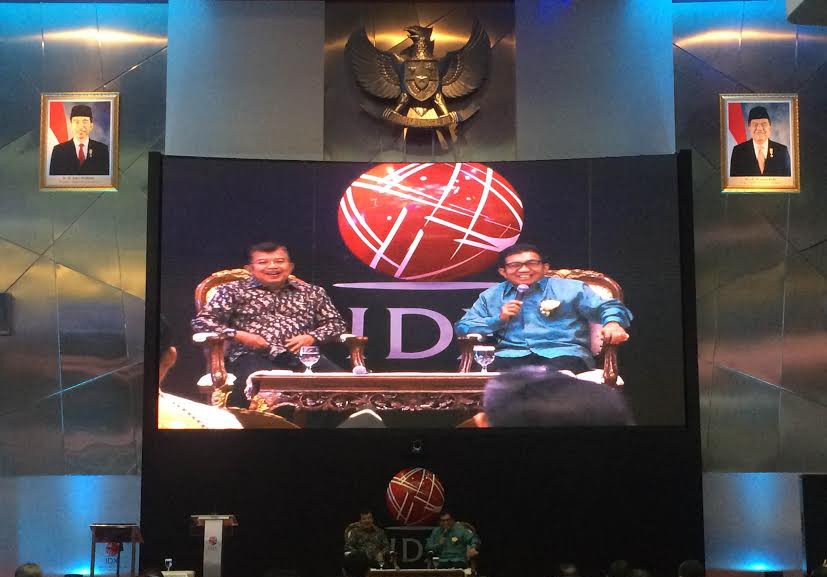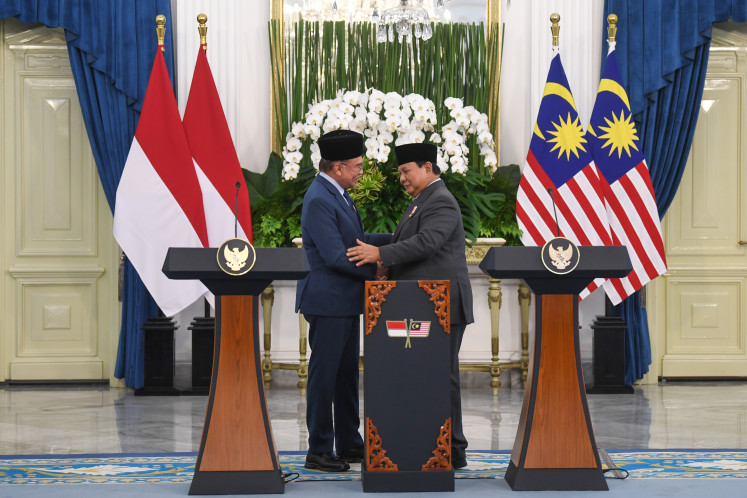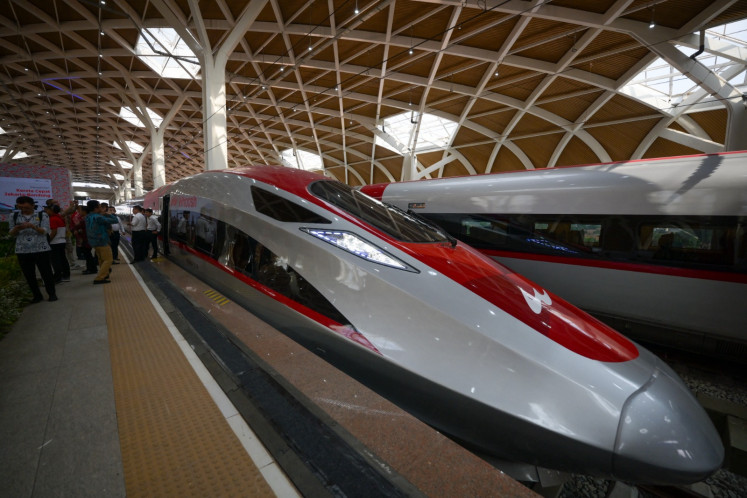Popular Reads
Top Results
Can't find what you're looking for?
View all search resultsPopular Reads
Top Results
Can't find what you're looking for?
View all search resultsOutlook bright for IDX in 2017
A new year equals new hope and the Indonesia Stock Exchange (IDX) is betting on a strong year that will attract more companies to float their shares on the bourse.
Change text size
Gift Premium Articles
to Anyone
 Financial Services Authority (OJK) chairman Muliaman D. Hadad (right) and Vice President Jusuf Kalla hold a discussion during 2017 first trading day opening at the Indonesia Stock Exhange (IDX) building in South Jakarta on Tuesday. (JP/Prima Wirayani))
Financial Services Authority (OJK) chairman Muliaman D. Hadad (right) and Vice President Jusuf Kalla hold a discussion during 2017 first trading day opening at the Indonesia Stock Exhange (IDX) building in South Jakarta on Tuesday. (JP/Prima Wirayani))
A
new year equals new hope and the Indonesia Stock Exchange (IDX) is betting on a strong year that will attract more companies to float their shares on the bourse.
IDX president director Tito Sulistio said on Tuesday during the opening of the first day of trading in 2017 that it expected to see 30 companies go public this year, following an improved economic situation and higher demand for stocks in the market.
“As the [Bank Indonesia rate] drops, pension funds and insurance companies cannot just depend on fixed income [investment instruments]. They will reallocate their investments to stocks,” he said.
As many as fourteen firms — subsidiaries of state-owned enterprises (SOEs) — are looking to go public this year, with some firms engaged in the infrastructure sector.
According to Kontan, two firms have at least shown commitment, namely insurance company Tugu Pratama Indonesia, a subsidiary of state-run oil and gas giant Pertamina, and Garuda Maintenance Facility, a subsidiary of national flag carrier Garuda Indonesia.
Vice President Jusuf Kalla said the government would continue to ease the procedures for SOEs and their subsidiaries to go public in order to boost the stock market’s credibility and growth and at the same time, open the door for firms to raise financing.
The current IPO process is rather lengthy and complicated because SOEs need to obtain a permit from the House of Representatives before offering their shares to the public.
Bloomberg recently reported that bonds, currencies and stocks in Asia’s emerging markets that were less dependent on external demand, such as India and Indonesia, were the most popular picks for investors and strategists next year.
IG Asia, for instance, favors Indonesian, Indian and Philippine equities. Amid subdued growth and an uncertain trade situation going into 2017, economies with strong domestic fundamentals appear to be “most promising”, said Jingyi Pan, a market strategist in Singapore.
In her view, “any dips close to the 5,000 level would make for a good entry”, into the Jakarta Composite Index (JCI).
The JCI, a benchmark for the IDX, opened at 5,296.71 on the first day of trading, an increase of around 17 percent compared to the first trading day of 2016.
As more companies jump on the IPO bandwagon, the IDX expects to increase its market capitalization to Rp 6.25 quadrillion (US$463.48 billion) in 2017 from Rp 5.76 quadrillion in 2016.
The bourse is eyeing a higher number of stock brokers as well, hoping to double the number to 5,400 this year so that average daily transactions can reach Rp 8 trillion from Rp 7.49 trillion last year.
Meanwhile, data from the IDX revealed that 2016 was a difficult time for companies to conduct an IPO, with only 16 companies listing their shares on the stock exchange, far from the IDX’s target of 25 companies or its earlier aim of 35 companies.
Mirae Asset Sekuritas Indonesia research head Taye Shim said Indonesia still faced challenges from a stronger US dollar and rising interest rates. However, he is optimistic that Indonesia’s core fundamentals are strong enough to withstand external shocks.
“Given that earnings are in the expansionary cycle, coupled with a recovery in commodity prices, we continue to believe that Indonesian equities remain attractive. Our JCI target for 2017 stands at 5,963,” he said in a statement.
Bahana Securities senior associate director and head of strategy and research Harry Su said investors were actually split on the outlook of commodities for the stock market in 2017.
Around 50 percent of the investors Bahana visited at its “road shows” believe commodity prices have run their course and therefore carry substantial downside risks from current levels.
On the other end of the spectrum, some investors believe that the market consensus has been slow to revise up commodity price assumptions, suggesting possible upside potential in equity prices.
“On a more negative note, many of the European investors we met at the road shows were oblivious to Indonesia’s perilous political situation and how the Ahok [Jakarta Governor Basuki “Ahok” Tjahaja Purnama] case could be an important determinant of not only investment into the country but also a precursor of what’s to come in the 2019 presidential election,” he wrote in a research note.









